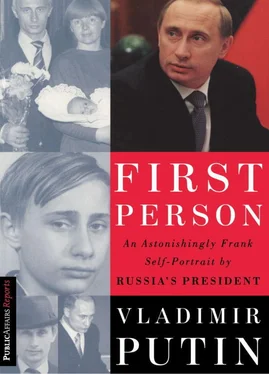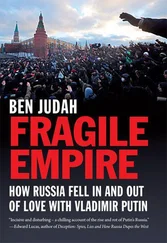Vladimir Putin - First Person
Здесь есть возможность читать онлайн «Vladimir Putin - First Person» весь текст электронной книги совершенно бесплатно (целиком полную версию без сокращений). В некоторых случаях можно слушать аудио, скачать через торрент в формате fb2 и присутствует краткое содержание. Город: New York, Год выпуска: 2000, ISBN: 2000, Издательство: PublicAffairs, Жанр: Биографии и Мемуары, Политика, Политика, Публицистика, на английском языке. Описание произведения, (предисловие) а так же отзывы посетителей доступны на портале библиотеки ЛибКат.
- Название:First Person
- Автор:
- Издательство:PublicAffairs
- Жанр:
- Год:2000
- Город:New York
- ISBN:978-0-786-72327-0
- Рейтинг книги:3 / 5. Голосов: 1
-
Избранное:Добавить в избранное
- Отзывы:
-
Ваша оценка:
- 60
- 1
- 2
- 3
- 4
- 5
First Person: краткое содержание, описание и аннотация
Предлагаем к чтению аннотацию, описание, краткое содержание или предисловие (зависит от того, что написал сам автор книги «First Person»). Если вы не нашли необходимую информацию о книге — напишите в комментариях, мы постараемся отыскать её.
First Person — читать онлайн бесплатно полную книгу (весь текст) целиком
Ниже представлен текст книги, разбитый по страницам. Система сохранения места последней прочитанной страницы, позволяет с удобством читать онлайн бесплатно книгу «First Person», без необходимости каждый раз заново искать на чём Вы остановились. Поставьте закладку, и сможете в любой момент перейти на страницу, на которой закончили чтение.
Интервал:
Закладка:
OLEG NIKOLAYEVICH SOSKOVETS:
Appointed first deputy chair of the government in 1993 (deputy prime minister) responsible for 14 ministries, including energy and transportation; assigned to deal with the Chechen conflict in 1994; joined Yeltsin presidential campaign team in 1996 but dismissed in March from the campaign, and, in June, was relieved of his post as first vice premier.
YURI SKURATOV:
Former Prosecutor General, suspended after a newspaper published a photograph of him in a steam bath with two prostitutes.
VLADIMIR ANATOLYEVICH YAKOVLEV:
First deputy mayor of St. Petersburg from 1993–1996; elected governor of St. Petersburg in 1996.
MARINA YENTALTSEVA:
Putin’s secretary at the St. Petersburg City Council (1991–96).
VALENTIN YUMASHEV:
Chief of staff in the Yeltsin administration
FRG — Federal Republic of Germany
FSB — Federal Security Service
FSK — Federal Counterintelligence Service
FSO — Federal Guard Servic
GDR — German Democratic Republic (East Germany)
KGB — Committee for State Security (Soviet era)
Komsomol — Young Communist League
Kukly — Puppets, a satirical TV show
MVD — Ministry of Internal Affairs or Interior Ministry
NATO — North Atlantic Treaty Organization
NKVD — People’s Commissariat for Internal Affairs, or the Stalin-era secret police
OSCE — Organization for Security and Cooperation in Europe, 54-member security and human rights body founded in 1975.
Pioneers — Soviet-era children’s organization
SED — East German Communist Party
Part I
THE SON
Putin talks about his parents, touching on his father’s World War II sabotage missions, the Siege of Leningrad, and life in a communal flat after the war. It isn’t easy—no hot water, no bathroom, a stinking toilet, and constant bickering. Putin spends much of his time chasing rats with a stick in the stairwell.
I know more about my father’s family than about my mother’s. My father’s father was born in St. Petersburg and worked as a cook. They were a very ordinary family. A cook, after all, is a cook. But apparently my grandfather cooked rather well, because after World War I he was offered a job in The Hills district on the outskirts of Moscow, where Lenin and the whole Ulyanov family lived. When Lenin died, my grandfather was transferred to one of Stalin’s dachas. He worked there a long time.
He wasn’t a victim of the purges?
No, for some reason they let him be. Few people who spent much time around Stalin came through unscathed, but my grandfather was one of them. He outlived Stalin, by the way, and in his later, retirement years he was a cook at the Moscow City Party Committee sanitorium in Ilinskoye.
Did your parents talk much about your grandfather?
I have a clear recollection of Ilinskoye myself, because I used to come for visits. My grandfather kept pretty quiet about his past life. My parents didn’t talk much about the past, either. People generally didn’t, back then. But when relatives would come to visit, there would be long chats around the table, and I would catch some snatches, some fragments of the conversation. But my parents never told me anything about themselves. Especially my father. He was a silent man.
I know my father was born in St. Petersburg in 1911. After World War I broke out, life was hard in the city. People were starving. The whole family moved to my grandmother’s home in the village of Pominovo, in the Tver region. Her house is still standing today, by the way; members of the family still spend their vacations there. It was in Pominovo that my father met my mother. They were both 17 years old when they got married.
Why? Did they have a reason to?
No, apparently not. Do you need a reason to get married? The main reason was love. And my father was headed for the army soon. Maybe they each wanted some sort of guarantee…. I don’t know.
Vera Dmitrievna Gurevich(Vladimir Putin’s schoolteacher from grades 4 through 8 in School No. 193):
Volodya’s [1] Russians use various diminutives for names, depending on degrees of familiarity and affection. Vladimir Putin is often called Vovka and Volodya by bis friends and family.
parents had a very difficult life. Can you imagine how courageous his mother must have been to give birth at age 41? Volodya’s father once said to me, “One of our sons would have been your age.” I assumed they must have lost another child during the war, but didn’t feel comfortable asking about it.
In 1932, Putin’s parents came to Peter [St. Petersburg]. They lived in the suburbs, in Peterhof. His mother went to work in a factory and his father was almost immediately drafted into the army, where he served on a submarine fleet. Within a year after he returned, they had two sons. One died a few months after birth.
Apparently, when the war broke out, your father went immediately to the front. He was a submariner who had just completed his term of service…
Yes, he went to the front as a volunteer.
And your mama?
Mama categorically refused to go anywhere. She stayed at home in Peterhof. When it became extremely hard to go on there, her brother in Peter took her in. He was a naval officer serving at the fleet’s headquarters in Smolny. [2] Smolny was a private girls’ school before the Revolution, when Lenin took it over and made it the headquarters of his revolutionary government. Since then it has been the seat of local government in St. Petersburg.
He came for her and the baby and got them out under gunfire and bombs.
And what about your grandfather, the cook? Didn’t he do anything to help them?
No. Back then, people generally didn’t ask for favors. I think that under the circumstances it would have been impossible, anyway. My grandfather had a lot of children, and all of his sons were at the front.
So your mother and brother were taken from Peterhof, which was under blockade, to Leningrad, which was also blockaded?
Where else could they go? Mama said that some sort of shelters were being set up in Leningrad, in an effort to save the children’s lives. It was in one of those children’s homes that my second brother came down with diphtheria and died.
How did she survive?
My uncle helped her. He would feed her out of his own rations. There was a time when he was transferred somewhere for a while, and she was on the verge of starvation. This is no exaggeration. Once my mother fainted from hunger. People thought she had died, and they laid her out with the corpses. Luckily Mama woke up in time and started moaning. By some miracle, she lived. She made it through the entire blockade of Leningrad. They didn’t get her out until the danger was past.
And where was your father?
My father was in the battlefield the whole time. He had been assigned to a demolitions battalion of the NKVD. These battalions were engaged in sabotage behind German lines. My father took part in one such operation. There were 28 people in his group. They were dropped into Kingisepp. They took a good look around, set up a position in the forest, and even managed to blow up a munitions depot before they ran out of food. They came across some local residents, Estonians, who brought them food but later gave them up to the Germans.
They had almost no chance of surviving. The Germans had them surrounded on all sides, and only a few people, including my father, managed to break out. Then the chase was on. The remnants of the unit headed off toward the front line. They lost a few more people along the road and decided to split up. My father jumped into a swamp over his head and breathed through a hollow reed until the dogs had passed by. That’s how he survived. Only 4 of the 28 men in his unit made it back home.
Читать дальшеИнтервал:
Закладка:
Похожие книги на «First Person»
Представляем Вашему вниманию похожие книги на «First Person» списком для выбора. Мы отобрали схожую по названию и смыслу литературу в надежде предоставить читателям больше вариантов отыскать новые, интересные, ещё непрочитанные произведения.
Обсуждение, отзывы о книге «First Person» и просто собственные мнения читателей. Оставьте ваши комментарии, напишите, что Вы думаете о произведении, его смысле или главных героях. Укажите что конкретно понравилось, а что нет, и почему Вы так считаете.












